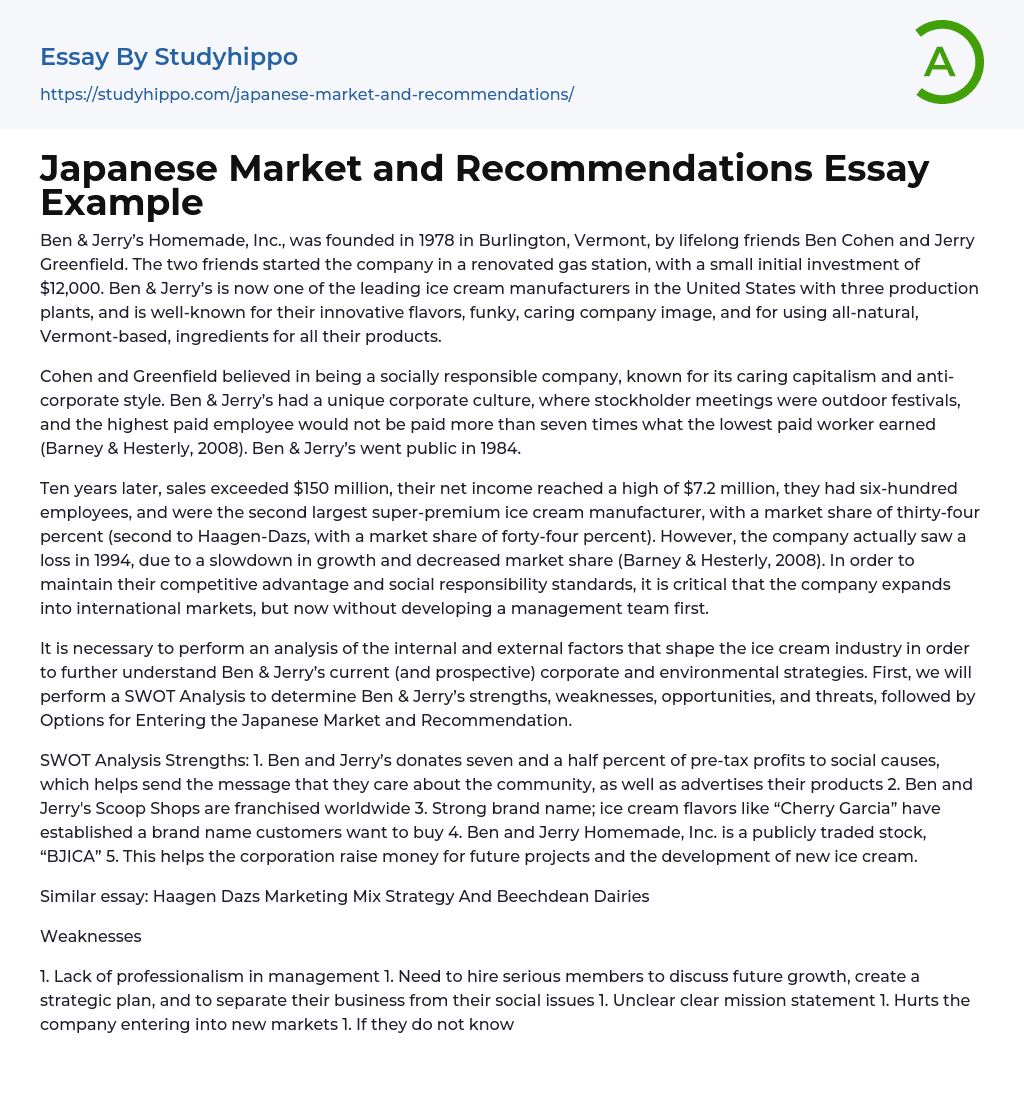Ben & Jerry’s Homemade, Inc., was founded in 1978 in Burlington, Vermont, by lifelong friends Ben Cohen and Jerry Greenfield. The two friends started the company in a renovated gas station, with a small initial investment of $12,000. Ben & Jerry’s is now one of the leading ice cream manufacturers in the United States with three production plants, and is well-known for their innovative flavors, funky, caring company image, and for using all-natural, Vermont-based, ingredients for all their products.
Cohen and Greenfield believed in being a socially responsible company, known for its caring capitalism and anti-corporate style. Ben & Jerry’s had a unique corporate culture, where stockholder meetings were outdoor festivals, and the highest paid employee would not be paid more than seven times what the lowest paid worker earned (Barney & Hesterly, 2008). Ben & Jerry’s went public
...in 1984.
Ten years later, sales exceeded $150 million, their net income reached a high of $7.2 million, they had six-hundred employees, and were the second largest super-premium ice cream manufacturer, with a market share of thirty-four percent (second to Haagen-Dazs, with a market share of forty-four percent). However, the company actually saw a loss in 1994, due to a slowdown in growth and decreased market share (Barney & Hesterly, 2008). In order to maintain their competitive advantage and social responsibility standards, it is critical that the company expands into international markets, but now without developing a management team first.
It is necessary to perform an analysis of the internal and external factors that shape the ice cream industry in order to further understand Ben & Jerry’s current (and prospective) corporate and environmental strategies. First, we will perform a SWO
Analysis to determine Ben & Jerry’s strengths, weaknesses, opportunities, and threats, followed by Options for Entering the Japanese Market and Recommendation.
SWOT Analysis Strengths: 1. Ben and Jerry’s donates seven and a half percent of pre-tax profits to social causes, which helps send the message that they care about the community, as well as advertises their products 2. Ben and Jerry's Scoop Shops are franchised worldwide 3. Strong brand name; ice cream flavors like “Cherry Garcia” have established a brand name customers want to buy 4. Ben and Jerry Homemade, Inc. is a publicly traded stock, “BJICA” 5. This helps the corporation raise money for future projects and the development of new ice cream.
Similar essay: Haagen Dazs Marketing Mix Strategy And Beechdean Dairies
Weaknesses
1. Lack of professionalism in management 1. Need to hire serious members to discuss future growth, create a strategic plan, and to separate their business from their social issues 1. Unclear clear mission statement 1. Hurts the company entering into new markets 1. If they do not know what direction they are headed in, they will fail at maintaining a successful business strategy in a new foreign market 2. They need to enter new ventures with the end in mind.
1. Their focus on social responsibility issues could hurt the company by: 1. Shifting focus away from important business matters and not being able to capitalize on new markets if they do not fit in with their social beliefs 2. Adding unnecessary costs; the money spent on social issues may be better invested in a strategic management team Opportunities1. Market to health conscious consumers by introducing fat-free and healthy ice cream/frozen yogurt products 2. Expand existing product lines to compete with the private, in-house brands offered by
supermarkets, which controls twenty-nine percent of U.S. ice cream sales 3. Develop a strategic management team and continue international expansion.
1. Ben ; Jerry’s may enter new markets, such as Brazil, South America, and China, and thus expand their customer base, and increase profits 1. Merge with a company to gain more advantage in the industry Threats 1. Target market is changing because of customer preferences 1. Customers are wanting to prevent obesity 2. Customers are more apt to buy substitute products due to the current state of the economy 1. Contamination of the food supply 1. Milk 2. Egg (contamination, like e-coli) 1. Cost of supplies could potentially increase, thus causing the price of Ben and Jerry’s ice cream to increase as well.
Options for Entering the Japanese Market Ben ; Jerry’s had a couple different options for entering the Japanese market. Their first option was to gain distribution through the use of Domino’s Pizza/Mr. Yamada, or partnering with 7-Eleven/Mr. Iida, or simply not entering the market at all. We have created the following list of pros and cons to determine which option best suits the needs of Ben ; Jerry’s.
- Wal-Mart essays
- Discover essays
- Advertisement essays
- Advertising essays
- Anheuser-busch essays
- Audience Theory essays
- Brand essays
- Brands essays
- Competitor Analysis essays
- Consumer essays
- Detergent essays
- Marketing Management essays
- Marketing Mix essays
- Marketing Plan essays
- Marketing Research essays
- Marketing Strategy essays
- New Product Development essays
- Point Of Sale essays
- Price essays
- Procurement essays
- Product essays
- Product Differentiation essays
- Product Placement essays
- Promotion essays
- Promotion And Marketing Communications essays
- Research Design essays
- Retailing essays
- Trademark essays
- Customer essays
- Customer Satisfaction essays
- Customer Service essays
- Target Market essays
- Bangladesh essays
- China essays
- Hong Kong essays
- India essays
- Japan essays
- Kuala Lumpur essays
- Malaysia essays
- Manila essays
- Pakistan essays
- Philippines essays
- Singapore essays
- Vietnam essays
- Vietnamese essays
- Business Analysis essays
- Business Plan essays
- Community Development essays
- Competition essays
- Effective Leadership essays




